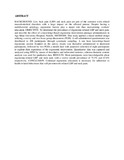| dc.contributor.author | Wanyonyi, N | |
| dc.contributor.author | Frantz, J | |
| dc.contributor.author | Saidi, H | |
| dc.date.accessioned | 2015-09-28T07:54:16Z | |
| dc.date.available | 2015-09-28T07:54:16Z | |
| dc.date.issued | 2015-08 | |
| dc.identifier.citation | Work. 2015 Aug 4. | en_US |
| dc.identifier.issn | http://www.ncbi.nlm.nih.gov/pubmed/26409376 | |
| dc.identifier.uri | http://hdl.handle.net/11295/91532 | |
| dc.description.abstract | BACKGROUND:
Low back pain (LBP) and neck pain are part of the common work-related musculoskeletal disorders with a large impact on the affected person. Despite having a multifactorial aetiology, ergonomic factors play a major role thus necessitating workers' education.
OBJECTIVE:
To determine the prevalence of ergonomic-related LBP and neck pain, and describe the effect of a knowledge-based ergonomic intervention amongst administrators in Aga Khan University Hospital, Nairobi.
METHODS:
This study applied a mixed method design utilizing a survey and two focus group discussions (FGD). A self-administered questionnaire was distributed to 208 participants through systematic sampling. A one hour knowledge-based ergonomic session founded on the survey results was thereafter administered to interested participants, followed by two FGDs a month later with purposive selection of eight participants to explore their experience of the ergonomic intervention. Quantitative data was captured and analyzed using SPSS by means of descriptive and inferential statistics, whereas thematic content analysis was used for qualitative data.
RESULTS:
Most participants were knowledgeable about ergonomic-related LBP and neck pain with a twelve month prevalence of 75.5% and 67.8% respectively.
CONCLUSION:
Continual ergonomic education is necessary for adherence to health-related behaviours that will preventwork-related LBP and neck pain. | en_US |
| dc.language.iso | en | en_US |
| dc.publisher | University of Nairobi | en_US |
| dc.subject | Low back pain; exercises; neck pain; posture; work-related musculoskeletal disorders (WRMDs) | en_US |
| dc.title | The effect of a knowledge-based ergonomic intervention amongst administrators at Aga Khan University Hospital, Nairobi. | en_US |
| dc.type | Article | en_US |
| dc.type.material | en | en_US |

